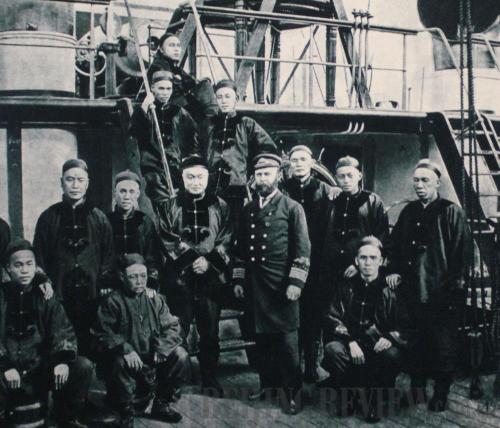|
 |
|
BEIYANG FLEET: Deng Shichang (1849-94) (third left, second row), captain of Zhiyuan, and William Lang (1843-1906) (fourth left, second row) pose for a photo with some Chinese personnel before the Jiawu War. Zhiyuan was sunk by the Japanese during the Battle of the Yalu River. Deng reportedly drowned himself after the loss (FILE PHOTO) |
"Their attitude partially stemmed from the belief that China was superior to the West in everything except weaponry," said Lei Yi, a researcher with the Institute of Modern History under the Chinese Academy of Social Sciences (CASS). "With such an attitude, there could be no real modernization."
"Most of the time, local Self-Strengthening promoters fought with one another rather than cooperating. They usually thought of their achievements as the foundation of personal power," said Li Renkai (1940-2006), late professor with the Department of History of Baoding-based Hebei University.
Furthermore, a lack of popular participation also restricted the scope of modernization. Leadership operated in a top-down fashion, with little low-level support as there was during Japan's Meiji Restoration.
"The primary aim of those Self-Strengthening officials was to save the ramshackle Qing Dynasty. They strove to strengthen the existing order instead of replacing it. They never considered remaking China into a modern state," Lei said.
A modernizing Japan
Almost from the day they seized power, the Meiji statesmen in Japan had been determined to make their country a modern, powerful, and worthy of respect internationally.
"The men who seized power in 1868 were nationalists who railed against Japan's semi-colonial status. They were Japanese who were sympathetic to the problems confronting their countrymen," suggested Matsudaira Shungaku (1828-90), a politician during the Meiji Period (1867-1912).
During the two Opium Wars of 1840-42 and 1856-60, Japan watched in horror as European armies forced their way into China. Their first taste of imperialism came in 1854, when the Americans forced Japan to sign the Convention of Kanagawa, which opened two Japanese ports to the United States along with other favorable arrangements.
In 1858, Japan succumbed to continuing Western pressure and signed a set of treaties with the United States, Holland, Britain, France and Russia. The American treaty opened more Japanese ports, allowed commercial activities and set tariff rates.
Against this background, reformers in Japan had pinpointed the need to create more flexible governing institutions that could enlist the abilities of men of talent, promote national unity under the aegis of the Emperor of Japan and build Japan into a great power equal to the most advanced nations on the face of the globe.
Itō Hirobumi (1841-1909) voiced this sentiment when he visited Sacramento, California, in 1872, "We came to study your strength, so that by adopting widely your better ways, we may hereafter be stronger ourselves. We shall labor to place Japan on an equal basis, in the future, with those countries whose modern civilization is now our guide."
The culmination of the Meiji reforms came in 1889, when the Constitution of the Empire of Japan was promulgated. The constitution established mechanisms for sharing power with elected representatives of the nation's citizenry and further promoted Japan into a modern state.
"For the first time, the Japanese people started enjoying the rights as 'nationals,' which gave them more confidence in serving their country. This was an important aspect that guaranteed the success of the Meiji Restoration and the later successes in the First Sino-Japanese War and the Russo-Japanese War (1904-05)," said Zong Zeya, author of The First Sino-Japanese War: 1894-95, published in Beijing in 2012.
| 